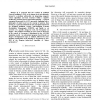Free Online Productivity Tools
i2Speak
i2Symbol
i2OCR
iTex2Img
iWeb2Print
iWeb2Shot
i2Type
iPdf2Split
iPdf2Merge
i2Bopomofo
i2Arabic
i2Style
i2Image
i2PDF
iLatex2Rtf
Sci2ools
119
click to vote
IJCNN
2006
IEEE
2006
IEEE
Patterns, Hypergraphs and Embodied General Intelligence
—It is proposed that the creation of Artificial General Intelligence (AGI) at the human level and ultimately beyond is a problem addressable via integrating computer science algorithms and data structures within a cognitive architecture oriented toward experiential learning. A general conceptual framework for AGI is presented, beginning with a philosophy of mind based on the concept of pattern, then moving to a general mathematical and conceptual framework for modeling intelligent systems, Self-Modifying Evolving Probabilistic Hypergraphs (SMEPH), and finally to an overview of a specific design for AGI, the Novamente AI Engine. The problem of teaching an AGI system is discussed, in the context of Novamente’s embodiment in the AGI-SIM simulation world. An educational program based loosely on Piaget’s developmental stages is outlined, followed by more detailed consideration of the learning by Novamente in AGISIM of the Piagetan infant-level capability of “object permanence.”
Artificial General Intelligence | Conceptual Framework | General Conceptual Framework | IJCNN 2006 |
Related Content
| Added | 11 Jun 2010 |
| Updated | 11 Jun 2010 |
| Type | Conference |
| Year | 2006 |
| Where | IJCNN |
| Authors | Ben Goertzel |
Comments (0)

